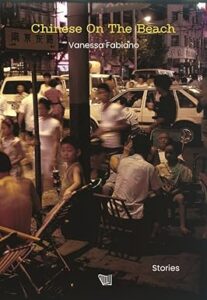A Swiss-Italian-Spanish author fluent in six languages (including English), Vanessa Fabiano first traveled to China more than thirty years ago and resided in Shanghai and Beijing around the time of SARS in the early 2000s. Her new collection of related stories, Chinese on the Beach, makes use of this timeframe, a period of growing friendships between Chinese and foreigners.
In the first story, “Bund Girls”, an unnamed narrator relays humorous stories about her female friends, Lulu, Bei, Christine, and Frederique, sparing no one in her critiques. Lulu has just married her long-term, foreign boyfriend Trevor and Bei is married to a real estate developer named Wang Deng. Frederique is their only European friend and Christine is from Hong Kong. Fabiano pokes fun at the rivalry between Hong Kong and Shanghai in her portrayal of Christine.
Christine has become a fixture in Shanghai circles. She adores Shanghai and it’s easy to see why. Not to disparage Hong Kong, but every cab driver knows Hong Kong is outdated. The whole concept is so last century. A city full of workaholic Cantonese living in cramped apartments. Not that we don’t work hard in Shanghai, but look at this place, look at Pudong. Nothing cramped about our rate of expansion. Of course, Christine wants to spend her time here, it’s the happening place in Asia.
Fabiano also shows why foreigners have been so drawn to older parts of Shanghai at a time when the city was developing at an extraordinarily rapid pace. Bei’s husband, the real estate developer Wang Deng, has made his riches during the early years of the hot Shanghai real estate market.
Wang Deng can’t understand why foreigners are lining up to pay a premium to live in something that’s older than he is, but he’s not complaining. I can see what he means. The villas are pretty with their tree-lined streets and all. But really, nothing beats good plumbing.

The book takes its name from one of the shortest stories in the collection, “Chinese on the Beach”, set on the western New Year’s Eve—December 31st—when Frederique and her friend Noel leave Beijing on a ten-hour train ride to the beach even though the temperatures are cold. The two speak about their observations of China’s changing economy and the friends’ prediction that their home countries in the West will soon lag behind China.
Other stories center around friendships between Chinese and foreigners. “Pig Bone Buddha” is a story that comprises several travel vignettes from a young female expat who travels around China, including Xian, Shanghai, and Beijing. The first vignette is set on the Trans-Siberian and begins just as the train leaves Moscow for Beijing:
Old women swarmed out of the flat emptiness and clotted on the windswept platform, bargaining, hustling. They unwrapped desolate objects and arranged them on faded blankets. Loafs [sic] of rock-hard break, bruised fruit, frayed officer caps. A pile of sickle and hammer pins, the remains of a failed empire.
As this story concludes, the narrator is still unnamed but in the following story her identity is revealed. Fabiano uses this style throughout her book—not naming a character in one story, only to do so in the next—a creative way of connecting the stories together and of keeping the reader engaged.
In “Friendship Hotel”, the story that follows “Pig Bone Buddha”, the train traveler is revealed to be Lea, the daughter of a Mr Svensson, an American expat who moves to China in the 1980s to teach English for a year or two. Svensson ends up staying in China, never to return to the US. This story is one of the most endearing of the book and follows the friendship of Lea and a favorite student of her father’s.
By the end of the book, the tone of the book is one of melancholy. But this melancholy is not so much the stories themselves but more because one can look back at the early 2000s now and see how the current state of worsening Sino-US relations have led to fewer student and teacher exchanges and therefore fewer chances for the friendships that Fabiano outlines in her book.


You must be logged in to post a comment.